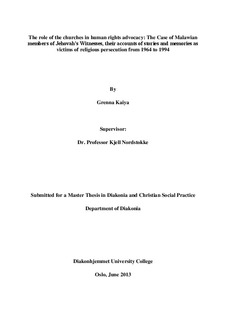| dc.description.abstract | Through the life history and narrative approach, this study collects and documents the life experiences of members of Jehovah’s Witness in Malawi for thirty years (between 1964 when Malawi got her independent, to 1994 when democracy came). The mentioned period covers the time when Malawi was under one-party system, ruled by an autocratic leader Dr. Hastings Kamuzu Banda and his party Malawi Congress Party (MCP). During this time, members of Jehovah’s Witness became victims of religious persecution for refusing to buy Malawi Congress Party membership card. It was a requirement by law for every born Malawian citizen living in Malawi to buy the MCP membership card. The theories of Prophetic Diakonia (Diakonia in Context: 2009), Ecumenical Diakonia (Ferguson and Ortega, World Council of Churches: 2002) and the Freedom of Religion as a Human Right (Boyle and Sheen: 1997) guided in analyzing this study. The theories enabled this study to critically look at the role of the churches in Malawi during this same period, to analyze response of the churches in fighting against injustice towards members of Jehovah’s Witness in Malawi. The study has shown the changing positions of the churches in Malawi, in their fight for human rights and becoming a prophetic voice. The study findings include the details of persecution that members of Jehovah’ Witness experienced which include; detentions, beatings, burning of houses, destruction of crops, discrimination, forced to flee the country, death and the silent churches. Using the theories of prophetic diakonia and ecumenical diakonia, the study does reveal that the churches in Malawi compromised their prophetic voice. | no_NO |
